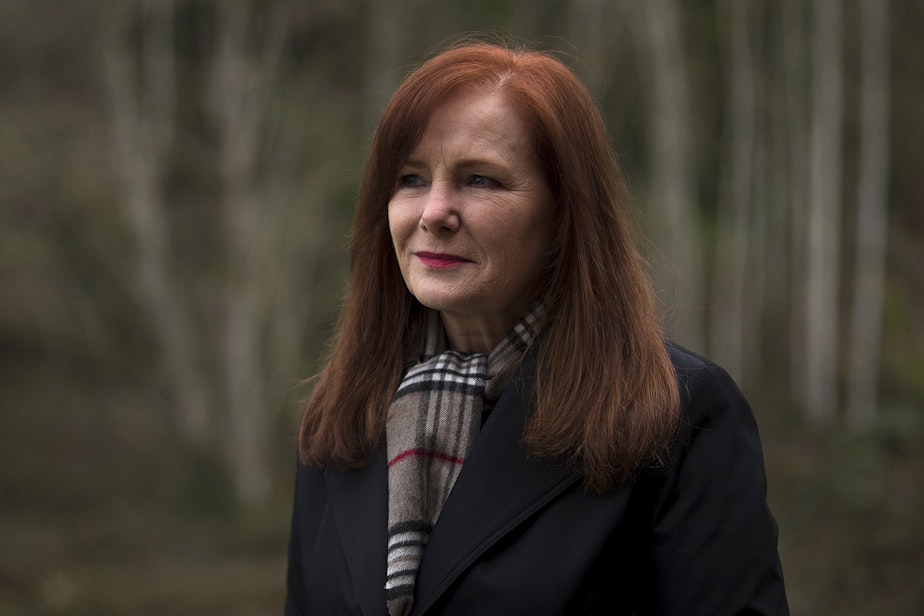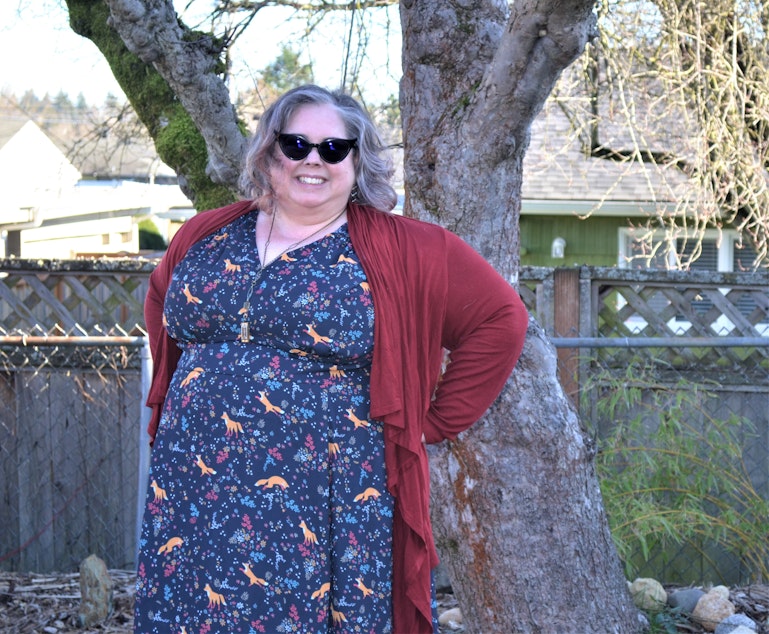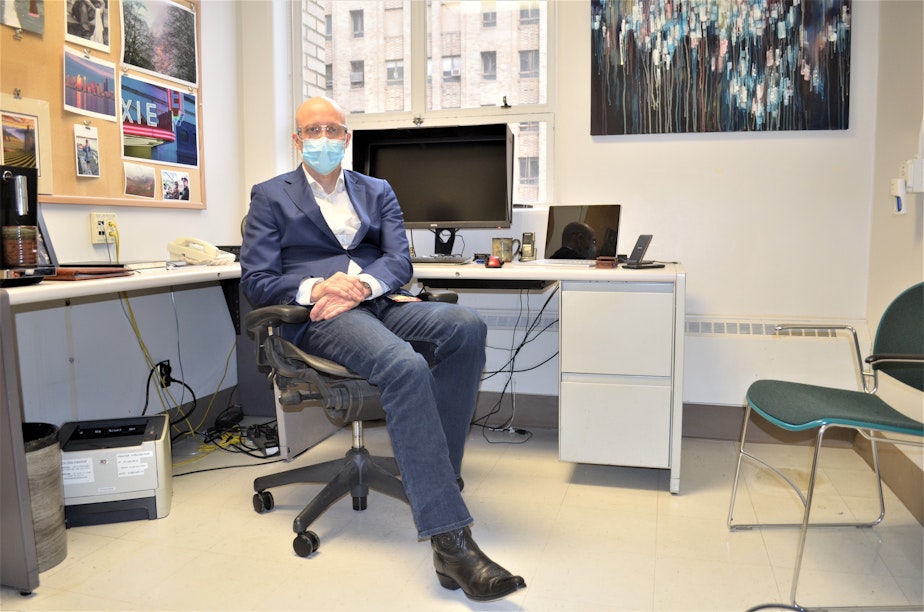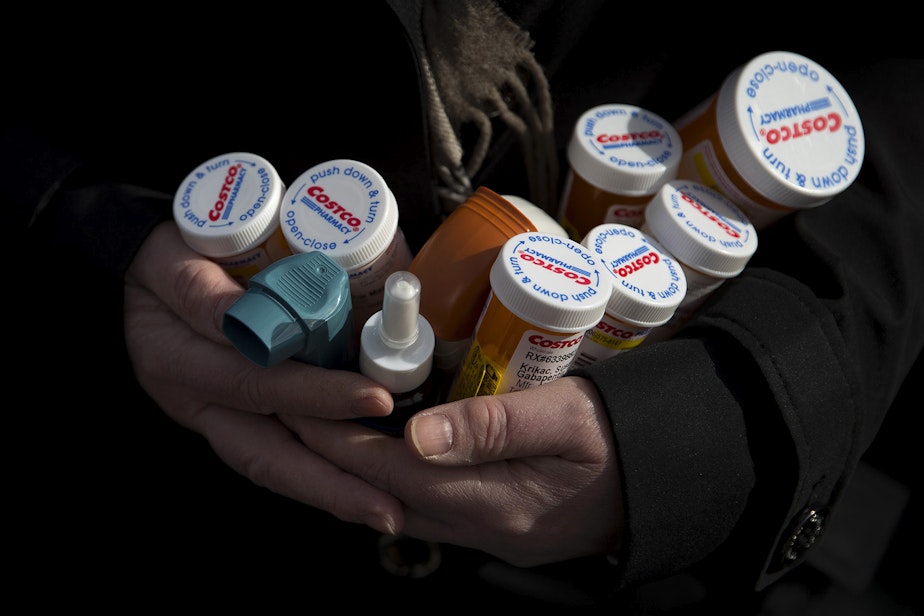‘Who knows if I’ll be myself again?’ Covid long-haulers turn to Seattle rehab clinic

Finding helpful medical care can be difficult for Covid-19 survivors who still experience long-term effects of the disease.
But a rehabilitation clinic for Covid long-haulers at Harborview Medical Center aims to help patients get back "as much life as possible."
D
onna Lawson, 47, got Covid last March. It seemed like a mild case at first. But then things got worse.
In May, Lawson was hospitalized for three days with low blood oxygen. And when she got home, she didn’t get better.
“My legs feel like jello all the time — very, very weak,” said Lawson, a designer and mother based in West Seattle. “On really bad days and bad times, I'm trudging through concrete is what it feels like — or like there are cinder blocks literally on my feet, or magnets pulling me to the ground.”
Many people who got Covid-19 early on are still feeling the effects of the disease months after their initial diagnosis. Now, some of them are seeking help from a special clinic at Harborview for Covid “long-haulers.”
Sponsored
Lawson said she can’t concentrate or remember things. She’s tired all the time and no longer has the energy to make art, or volunteer at her daughter’s school. On a good day, she said, she’s 80% of her old self for a few hours. Other days, she can’t get out of bed.

“The stuff that gets me really choked up: Who knows if I’ll be myself again?” Lawson said. “I'm usually a pretty confident person. I really love helping people and I love spreading joy. It's really hard to do that when you don't feel joy.”
Approximately 10% of people who get Covid still have at least one symptom two months after their diagnosis — and there’s a gender disparity. More women than men suffer from what’s being called long Covid.
They have a broad range of symptoms, from shortness of breath to trouble sleeping or concentrating to depression or anxiety.
Sponsored
Researchers don’t yet know what causes all of these symptoms. Long-haulers’ immune systems could still be in overdrive. Or maybe their brains are still suffering from being deprived of oxygen. Doctors say, when they understand long Covid better, they’ll be able to offer more effective treatments.
Lawson was never able to get a Covid test because there weren’t many available at the beginning of the pandemic. Because of that, some doctors haven’t believed that her symptoms are due to long Covid, she said.
“When you have medical professionals pooh-pooh what you're saying, you can't help but wonder if you're crazy,” said Lawson, who goes to four or more doctor's appointments in a normal week.
One person who’s trying to help long-haulers find the care they need is Dr. Aaron Bunnell, a rehabilitation physician at the University of Washington’s Harborview Medical Center.
At the beginning of the pandemic, Bunnell worked with Covid patients after they were released from intensive care units. But over time, it became clear:
Sponsored
“It's not just the patients that have been hospitalized and who were very sick that are having long-term symptoms,” Bunnell said. “We're seeing this even in patients who may have been sick at home, but now three months later are still struggling.”

That’s why Bunnell started a clinic at Harborview that specifically serves Covid long-haulers. It’s one of many such clinics that are popping up across the country.
The clinic is part medical office, part gym, with treadmills, parallel bars, and other equipment to help patients build back strength and the ability to walk. Bunnell seems to know everyone who’s here.
Bunnell and his team are experts in rehab medicine. They help patients with their recovery and coordinate their complex care. Their goal, Bunnell said, is to help patients get back to whatever they were doing before they got sick.
Sponsored
“We see in our critical illness survivors that, yeah — their heart is still beating, and they’re breathing,” Bunnell said. “But everything that they valued and was meaningful in their life is now lost. We just want to make sure we’re getting our Covid patients as much life as possible.”
Harborview’s Covid rehabilitation clinic is the only facility of its kind in the region, serving patients from Oregon, Alaska, and Idaho, in addition to Washington. Bunnell says, at first, there was only a trickle of patients, but, now, the clinic gets 40 new patients every week.
Susan Krikac, a 61-year-old optician, receives care at the clinic. Back in July, both she and her 25-year-old daughter, whom she lives with, fell ill with Covid.
Krikac said there were nights when she could hardly breathe and thought she might die. But, over time, that improved. And by September, she thought she was on the mend.
“I started feeling pretty good,” Krikac said. “And I was talking on the phone to a girlfriend one afternoon, telling her that I was about ready to go back to work when I started talking what I would call jibber jabber — I wasn't making sense. And she said, ‘I think you should put the phone down and call 911.’”
Sponsored
By the time she was admitted to the hospital, she couldn’t even read her doctor’s name, Krikac said.

Thereafter, she started cycling in and out of the emergency room with stroke-like symptoms, and looking for specialists who could help her with ongoing memory loss and an inability to concentrate.
“My personality has definitely changed,” Krikac said. “I don’t laugh. I don’t joke as much as I did. My coworkers said that they miss my sense of humor. I miss my sense of humor.”
Eventually, Krikac ended up at Harborview’s post-Covid clinic. The doctor coordinating her care decided to first work on helping her get more than a few hours of sleep each night, in hopes that might alleviate some of her memory loss and depression.
“I can only hope that with time, as I start to recover, that my mood will increase,” Krikac said — “that I'll be able to do some of the things that I used to be able to do.”
Krikac said she wants to eventually get back to work, at least part-time.
At the post-Covid clinic, Dr. Bunnell said he hopes ongoing research will uncover the reasons for these symptoms and better ways to treat them. That way, more long-haulers will be able to get back to the things they used to do.




